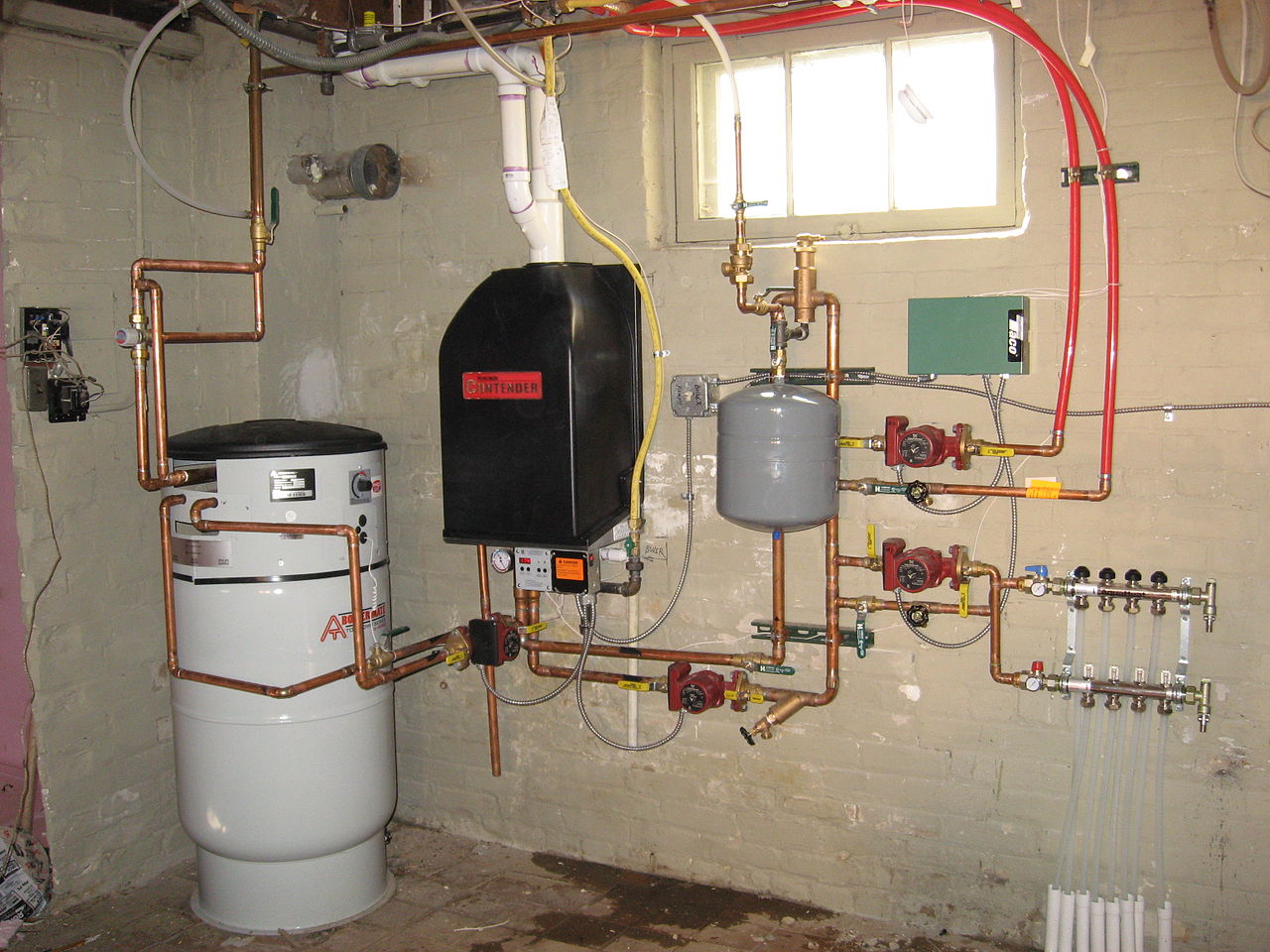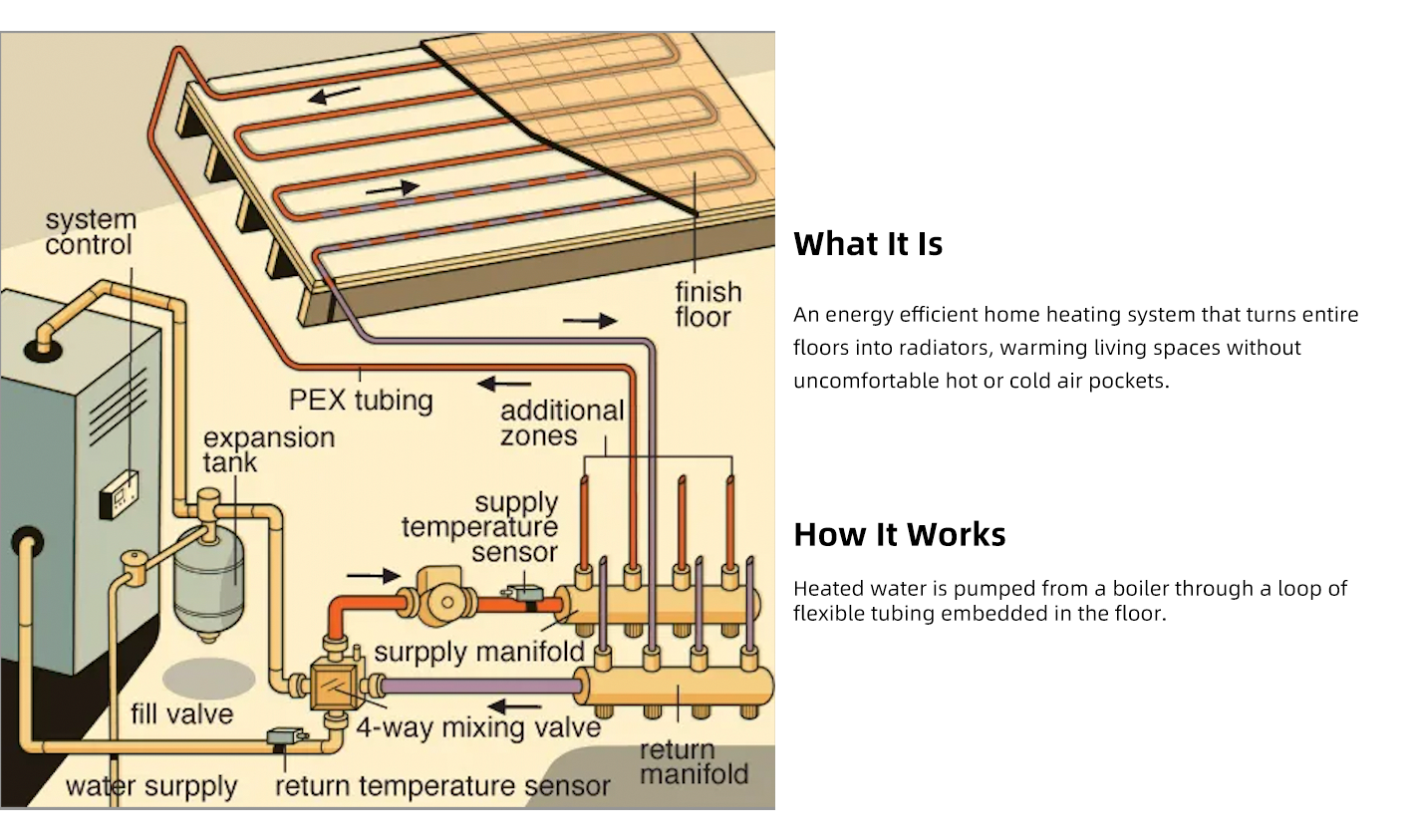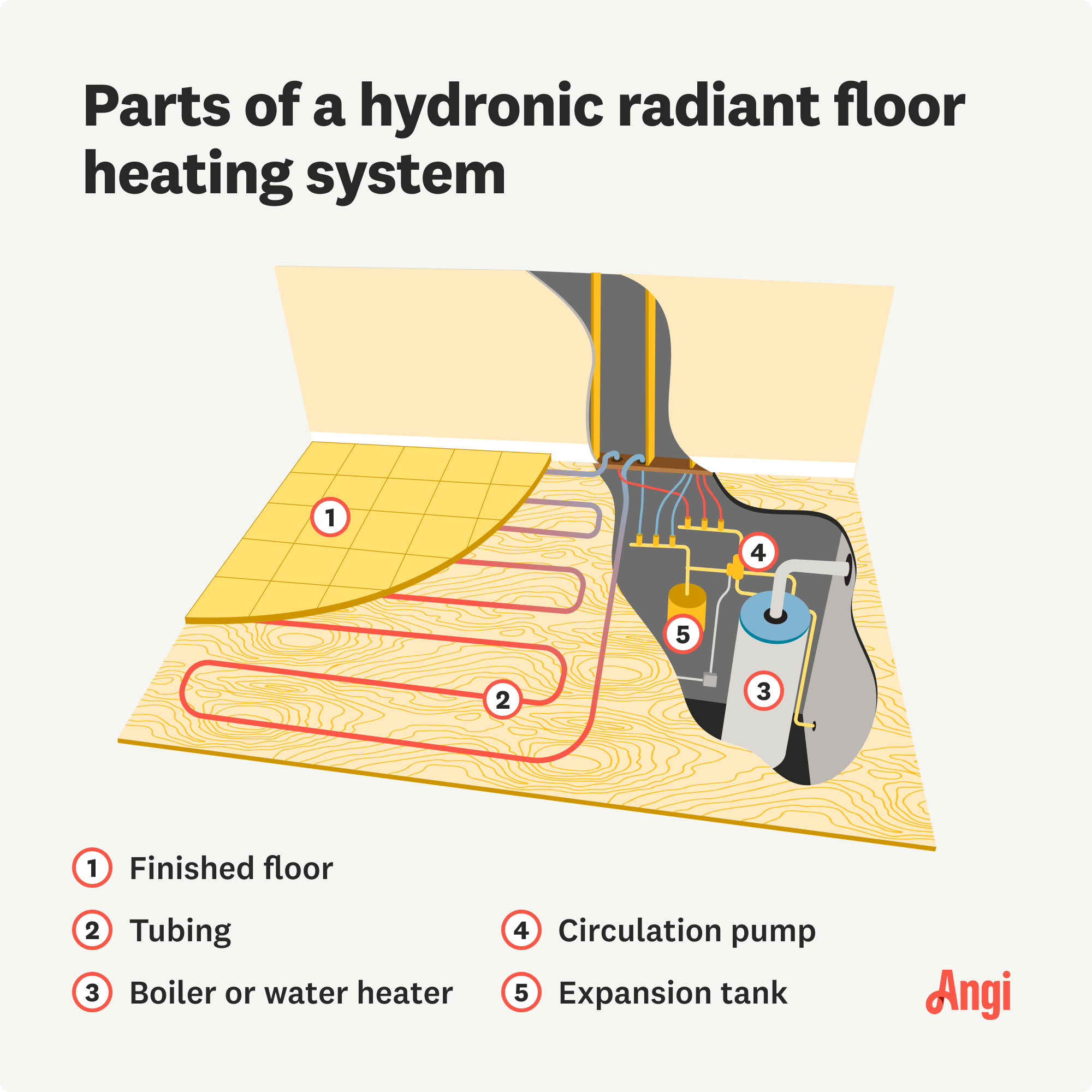Imagine stepping onto your floor on a chilly morning and feeling a comforting warmth spread beneath your feet. Sounds delightful, right?
That’s the magic of radiant floor heating. But when it comes to choosing the right system, you might find yourself torn between using a water heater or a boiler. Which one will provide the cozy comfort you crave while being efficient and cost-effective?
This decision can seem daunting, but don’t worry—you’re not alone. We’ll break down the key differences between radiant floor heating water heaters and boilers. We’ll guide you through the benefits, drawbacks, and the impact each option can have on your home and wallet. By the end, you’ll have a clear picture of which system suits your needs best. Keep reading to discover how to make your floors—and your life—warm and inviting.

Credit: mpglobalproducts.com
Radiant Floor Heating Basics
Radiant floor heating offers a comfortable warmth. It heats the floor directly. This method provides an even heat distribution. Unlike traditional heating, it reduces energy loss. Radiant heating is quieter and cleaner. It doesn’t blow dust or allergens around. It’s an efficient way to heat your home.
How It Works
Radiant floor heating uses heat transfer. It involves panels or tubes under the floor. These systems heat the floor surface. The heat then radiates upwards. Warm air naturally rises, heating the room. This creates a cozy environment. The system can run on electricity or water. Water systems use a boiler or water heater.
Types Of Radiant Floor Heating
Two main types exist: electric and hydronic. Electric systems use heating cables. They’re ideal for small areas. Easy to install and maintain. Hydronic systems use hot water. They are efficient for large spaces. Hydronic systems use tubes to circulate water. They need a water heater or boiler.
Electric systems have a lower installation cost. Hydronic systems have lower operating costs. Both types offer unique benefits. Choosing depends on your needs and budget.
Water Heater Systems
Water heater systems are essential for radiant floor heating. They provide warmth and comfort during chilly months. Choosing the right system can make a huge difference. Two popular options are water heaters and boilers. Each has its unique features and benefits.
Functionality And Design
Water heaters heat water and circulate it through the floor pipes. They come in tank and tankless designs. Tank models store hot water for immediate use. Tankless heaters heat water on demand, saving space. Both types can efficiently warm floors.
Boilers also heat water for radiant systems. They are designed to offer consistent heat. Boilers often handle larger heating needs. They can be part of central heating systems. This makes them suitable for bigger homes.
Pros And Cons
Water heaters are typically more affordable. They are easy to install and maintain. They are perfect for smaller spaces. However, they might struggle in large areas.
Boilers provide steady, reliable heat. They excel in larger homes and spaces. They are often more energy-efficient. But, they come with higher initial costs. Installation can be complex and require professional help.
Boiler Systems
Boiler systems play a key role in radiant floor heating. They heat water and circulate it through pipes. These pipes are embedded in the floor. This method warms the floor and the entire room efficiently. Choosing the right boiler system can make a big difference in heating performance.
Functionality And Design
Boilers heat water using various fuels. Common options include gas, oil, or electricity. The heated water flows through a network of pipes. These pipes are usually laid under the floor. The floor absorbs the heat and radiates it into the room.
Boiler systems often feature a compact design. They can fit into small spaces. This makes them suitable for homes with limited space. Modern boilers also come with advanced features. They offer better temperature control and energy efficiency.
Pros And Cons
Boiler systems offer several advantages. They provide consistent and even heating. This makes living spaces more comfortable. Boilers are also energy-efficient. They can lower heating costs significantly.
On the downside, boiler systems can be expensive to install. They require professional installation and maintenance. Repairs can be costly too. Additionally, boilers take time to heat up. This might not be ideal for quick heating needs.
Efficiency Comparison
Choosing the right system for radiant floor heating can impact energy bills and comfort levels. Both water heaters and boilers offer unique benefits in terms of efficiency. Understanding their differences helps make an informed decision.
Energy Consumption
Water heaters generally consume less energy. They heat water on demand, reducing standby heat loss. Boilers maintain a reservoir of hot water, leading to continuous energy use. Many modern boilers are designed for efficiency, but they can still consume more energy than water heaters.
Cost-effectiveness
Initial costs for water heaters are often lower. They require less maintenance, saving money over time. Boilers can have higher upfront costs. They may need regular maintenance, adding to long-term expenses. But they can be more effective in larger homes, offering better heat distribution.
Installation Considerations
Radiant floor heating can use either water heaters or boilers. Choosing the right one depends on efficiency and budget. Boilers often provide better heating but can be more costly. Water heaters are cheaper but may not heat as evenly. Consider space, installation complexity, and energy needs before deciding.
Considering the installation of radiant floor heating? You might be debating between using a water heater or a boiler. Both options have their perks, but it’s crucial to understand the installation considerations before making a decision. Understanding space requirements, complexity, and costs will help guide your choice.Space Requirements
Space can be a major factor in your decision. Water heaters are usually smaller and can fit into tighter spaces. This makes them ideal if you have limited room in your home. Boilers, on the other hand, often require more space due to their larger size and additional components. If you have a dedicated utility room, a boiler might fit just fine. But, if space is a premium, a water heater could be the better option. Have you considered where you’d place the system in your home? Think about how much space you can spare.Complexity And Costs
Installing a water heater for radiant floor heating tends to be less complex. Water heaters are generally easier to install and maintain. This can save you both time and money upfront. In contrast, boiler systems can be more complex and require professional installation. They often come with higher initial costs due to the intricate setup. However, they might offer more efficient heating in the long run. Have you thought about your budget for the installation process? Balancing upfront costs with long-term efficiency is key. In my experience, considering these factors helped clarify my own choice. We chose a water heater due to limited space and a tighter budget. It was a practical decision that suited our home’s layout and financial plan. What about you? Which factors matter most in your decision-making process? Understanding your own priorities can lead you to the right choice for your radiant floor heating system.
Credit: www.greensafaris.com
Maintenance And Longevity
Radiant floor heating systems require less maintenance than boilers. Water heaters offer longevity with fewer moving parts. Boilers may need regular check-ups to ensure efficiency and lifespan.
When considering radiant floor heating, two popular options are water heaters and boilers. Each system has unique maintenance requirements and longevity, impacting your investment over time. Understanding these differences can help you decide which option best suits your home and lifestyle.Routine Maintenance Needs
Both water heaters and boilers require regular upkeep to function efficiently. Water heaters need periodic flushing to remove mineral buildup, especially if you live in an area with hard water. This simple task can extend the life of your system and maintain its performance. Boilers, on the other hand, demand a bit more attention. They need annual inspections to check for leaks, pressure levels, and overall system integrity. You might find this task cumbersome, but it ensures your system operates safely and efficiently. Would you prefer a straightforward maintenance routine, or are you comfortable with a bit more complexity for potentially greater efficiency?Expected Lifespan
The lifespan of your heating system is a crucial factor in your decision-making process. Water heaters typically last around 10-15 years. Their relatively short lifespan might mean more frequent replacements, but they often cost less upfront. Boilers can last significantly longer, often 15-30 years, with proper maintenance. This longevity can be appealing if you plan to stay in your home for an extended period. Think about your long-term plans. Do you value initial savings, or would you prefer a system that lasts longer? In my experience, investing in regular maintenance has paid off. I once skipped a boiler inspection, leading to an unexpected breakdown in the middle of winter. It taught me the value of routine checks and how they can save you from inconvenient and costly repairs. Which system aligns with your expectations for maintenance and longevity? Understanding these elements can guide you to a decision that balances both practicality and peace of mind.Environmental Impact
Exploring the environmental impact of heating systems is crucial. Radiant floor heating water heaters and boilers both affect the planet. Understanding their differences helps make an informed choice. This section delves into their carbon footprint and sustainability.
Carbon Footprint
Radiant floor heating water heaters typically use less energy. They heat directly through the floor, reducing waste. Boilers may consume more energy to heat water. This can lead to higher carbon emissions. Choosing energy-efficient models can decrease this impact.
Sustainability
Sustainable heating systems use renewable energy sources. Radiant floor heating can integrate with solar panels. This reduces reliance on fossil fuels. Boilers often rely on gas or oil. Renewable options for boilers are limited. Opting for renewable energy sources improves sustainability.
Choosing The Right System
Radiant floor heating systems can use either a water heater or a boiler. Each option has its benefits. Water heaters are often more affordable, while boilers offer higher efficiency for large areas. Your choice depends on budget and heating needs.
Choosing the right system for your radiant floor heating is crucial for both comfort and energy efficiency. You might be wondering whether a water heater or a boiler is the better choice for your home. To make this decision easier, it’s essential to consider several factors and understand the best applications for each system.Factors To Consider
When deciding between a radiant floor heating water heater and a boiler, think about your home’s specific needs. Size of the area is a significant factor. Water heaters are typically suitable for smaller spaces. If you have a large home, a boiler might be more efficient. Energy efficiency is another critical consideration. Boilers generally provide more consistent heating and can be more energy-efficient for larger areas. However, modern water heaters have also made strides in efficiency. Initial cost and installation can influence your decision. Water heaters tend to have a lower upfront cost and are easier to install. Boilers may require a more complex setup but can offer long-term savings in energy bills.Best Applications For Each System
Water heaters work well in smaller homes or spaces where the heating demand is minimal. They are also great for retrofitting older homes because they are compact and easier to install. Boilers are ideal for larger homes or areas with high heating demands. If you live in a colder climate, a boiler can provide the consistent warmth you need. They are also better suited for homes with existing radiant heating systems that need an upgrade. Have you ever walked into a friend’s home and felt the even, comfortable warmth underfoot? They might be using a boiler system. These systems are known for delivering uniform heat across large areas. You may wonder about the environmental impact of each choice. Boilers, especially those using natural gas, can be more eco-friendly over time compared to electric water heaters. Considering your home’s specific needs will guide you to the most suitable option. Which system aligns best with your lifestyle and budget?Expert Insights
Explore the efficiency of radiant floor heating with water heaters and boilers. Compare costs and installation ease. Discover which option suits your home for cozy warmth.
Radiant floor heating is gaining popularity as a modern solution for home heating. But when it comes to choosing between water heaters and boilers for this purpose, expert opinions can be invaluable. Understanding the nuances from industry professionals can guide you in making informed decisions for your home heating needs.Industry Opinions
Many experts in the field praise boilers for their efficiency in radiant floor heating systems. Boilers heat water to a higher temperature, making them ideal for larger spaces or homes in colder climates. They can often integrate seamlessly with existing heating systems, enhancing overall warmth. On the other hand, water heaters are known for their affordability and simplicity. They are perfect for smaller installations or for homeowners looking for an easy retrofit. A friend of mine, who recently installed radiant floor heating, opted for a water heater due to its lower upfront cost. He was delighted with the quick installation and consistent heat it provided. Which option resonates more with your needs? Consider the size of your space and budget when deciding.Future Trends In Radiant Heating
The radiant heating industry is evolving rapidly, with technology driving new trends. Smart systems are becoming more prevalent, offering homeowners the ability to control heating remotely via apps. This flexibility is not just convenient; it can lead to significant energy savings. Furthermore, eco-friendly solutions are on the rise. Innovations in solar-powered radiant heating systems are promising greener alternatives. Imagine harnessing the sun’s power to warm your floors—a sustainable dream becoming a reality. What trends are you most excited about? Embracing new technologies can transform how you experience home comfort. In the end, understanding expert insights can empower you to choose the best radiant heating solution for your home. Whether you lean towards a traditional boiler or a modern water heater, the future of radiant heating looks bright.
Credit: www.angi.com
Frequently Asked Questions
What Is Radiant Floor Heating?
Radiant floor heating uses heated water or electric coils under floors. It warms rooms evenly and efficiently.
How Does A Water Heater Compare To A Boiler?
Water heaters heat water for daily use. Boilers heat water for radiant floor systems, providing consistent warmth.
Which Is More Energy-efficient: Water Heater Or Boiler?
Boilers are generally more energy-efficient for heating floors. They distribute heat evenly and reduce energy waste.
Can Radiant Floor Heating Work With Any Flooring?
Yes, but some materials work better. Tile and stone conduct heat well. Carpet may reduce efficiency.
Is Installation Cost Higher For Boilers?
Yes, typically. Boilers require more complex installation. They are often more expensive than water heaters for radiant systems.
Conclusion
Choosing between a radiant floor heating water heater and a boiler can be tough. Both options warm your home efficiently. A water heater is often cheaper and easier to install. It suits small spaces well. A boiler, on the other hand, offers strong and even heating.
It is ideal for larger homes. Think about your home’s size and budget. Consider maintenance needs and energy efficiency. Making the right choice ensures comfort and savings in the long run. Always consult a professional for tailored advice. Your comfort and budget matter most.





